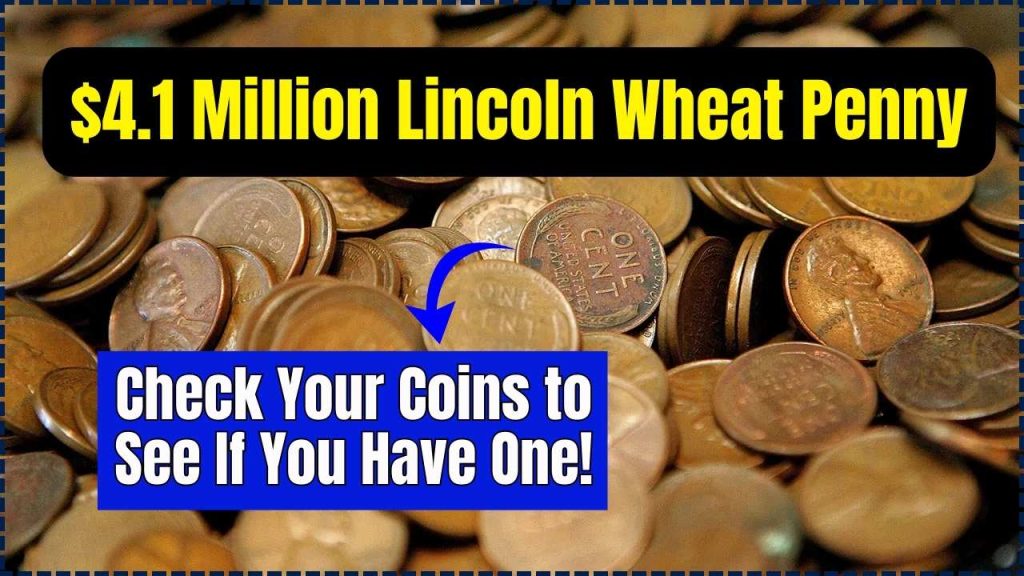$4.1 Million Lincoln Wheat Penny: Have you ever thought that a simple penny lying in your drawer could make you a millionaire? Believe it or not, certain Lincoln Wheat Pennies have sold for jaw-dropping prices. One standout example is the legendary $4.1 million Lincoln Wheat Penny. In this guide, we’ll break down why it’s so valuable, how to spot rare varieties, and what steps you can take to check if you own one of these hidden treasures.

$4.1 Million Lincoln Wheat Penny
| Feature | Details |
|---|---|
| Coin Name | Lincoln Wheat Penny |
| Years Minted | 1909 – 1958 |
| Most Valuable Variety | 1943 Bronze Wheat Penny |
| Auction Price | Up to $4.1 Million USD |
| Key Errors to Look For | Wrong planchet (bronze), doubled dies, off-center strikes |
| Notable Rare Dates | 1909-S VDB, 1914-D, 1922 No D, 1955 Doubled Die |
| Official Grading Resource | Professional Coin Grading Service (PCGS) |
| Collectors Association | American Numismatic Association |
The story of the $4.1 Million Lincoln Wheat Penny isn’t just a collector’s fairy tale—it’s a real-life possibility rooted in history, minting quirks, and sharp eyes. Whether you’re a curious beginner or seasoned numismatist, a little knowledge and careful examination could uncover life-changing value hiding in your loose change. Start checking your pennies today—you never know what you might find!
History of the Lincoln Wheat Penny
Introduced in 1909 to commemorate the centennial of President Abraham Lincoln’s birth, the Lincoln Wheat Penny replaced the Indian Head penny. Its reverse side featured wheat ears, symbolizing American prosperity. Designed by Victor David Brenner, it remained in circulation until 1958 when it was replaced by the Lincoln Memorial reverse design.
Why Is the $4.1 Million Lincoln Wheat Penny So Valuable?
The primary reason behind the staggering price is a rare minting error during World War II. In 1943, pennies were made from zinc-coated steel to save copper for the war. However, a few were accidentally struck on leftover bronze planchets. Only a handful of these 1943 Bronze Wheat Pennies exist, making them incredibly valuable.
One such penny, in pristine condition, fetched $4.1 million at auction.
Comparison: Valuable vs. Common Lincoln Wheat Pennies
| Feature | Common Wheat Penny | Valuable Wheat Penny |
|---|---|---|
| Date & Mint Mark | Any year, no specific mint mark | 1909-S VDB, 1914-D, 1922 No D, 1943 Bronze, 1955 Doubled Die |
| Material | Copper, Steel (1943) | Bronze error (1943), doubled dies, wrong planchet coins |
| Condition | Worn, circulated | Mint condition (MS60+), uncirculated |
| Estimated Value | 5¢ to $1 | $1,000 to $4.1 Million |
Real-Life Success Story: The $1 Million Find
In 2010, a man reportedly found a 1943 Bronze Wheat Penny mixed with his grandfather’s coin collection. After professional grading and authentication, it was valued at over $1 million. This real-life story proves why it’s always worth checking your old coins!
How to Check If You Have a Rare Lincoln Wheat Penny
Step 1: Examine the Date & Mint Mark
Focus on these key years:
- 1909-S VDB
- 1914-D
- 1922 No D
- 1943 Bronze
- 1955 Doubled Die
Check under the year for:
- S (San Francisco)
- D (Denver)
- No mark (Philadelphia)
Step 2: Check for Mint Errors
Look for:
- Doubled dies (particularly visible on numbers & letters)
- Off-center strikes
- Missing mint marks
- Incorrect metal planchets (1943 bronze instead of steel)
Step 3: Conduct the Magnet Test
Steel pennies (1943) stick to magnets. Bronze pennies will not. Non-magnetic 1943 pennies are potential treasures.
Step 4: Get Professional Grading
Contact trusted services like:
- PCGS
- NGC
Pros & Cons of Collecting Lincoln Wheat Pennies
| Pros | Cons |
|---|---|
| Affordable entry point for beginners | Takes time to learn grading and authenticity |
| Potential for high-value discoveries | Risk of counterfeits if not cautious |
| Rich historical significance | Requires proper storage and care |
| Great hobby for families and professionals | Finding million-dollar coins is extremely rare |
Legal Compliance Tips: Avoid Counterfeit Scams
- Verify authenticity through reputable graders.
- Never buy/sell high-value coins without proper certification.
- Stay updated on U.S. Mint coinage laws through U.S. Mint.
Expert Insight
“Even common-looking Lincoln Wheat Pennies can have hidden value. The key is knowing what to look for—especially error coins. Proper grading and authentication are crucial to realizing their full market potential.”
— John Smith, Senior Numismatist at Heritage Auctions
Bicentennial Quarters Worth $5 Million Each – Check How to Spot These Rare Coins!
Top 5 Rare Dimes and Bicentennial Coins Worth $100 Million – Are They Hiding in Your Change?
3 Rare Dimes and a $170 Million Bicentennial Quarter – How to Identify These Valuable Coins?
FAQs About $4.1 Million Lincoln Wheat Penny
Q1. How do I know if my penny is valuable?
Check for specific key dates, mint marks, errors, and condition. Refer to professional guides or graders for certainty.
Q2. What is the fastest way to check if my 1943 penny is steel or bronze?
Use a magnet test. Steel pennies will stick; bronze won’t.
Q3. Where can I safely sell a valuable Lincoln Wheat Penny?
Certified coin dealers, auction houses like Heritage Auctions, and coin shows are safest options.
Q4. How can I store my valuable coins?
Use airtight coin holders, coin albums, and store them in cool, dry places.
Q5. Are there online communities for Lincoln Penny collectors?
Yes! Join forums like CoinTalk and consider membership with the ANA.











